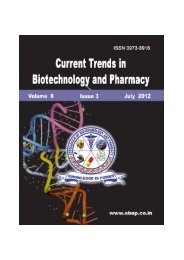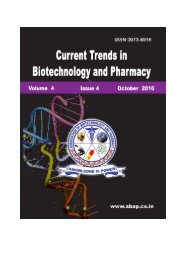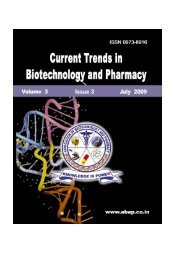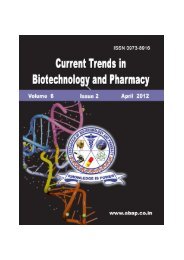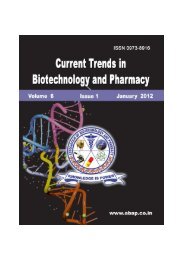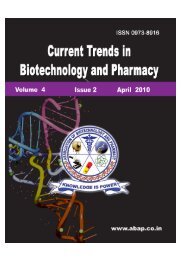April Journal-2009.p65 - Association of Biotechnology and Pharmacy
April Journal-2009.p65 - Association of Biotechnology and Pharmacy
April Journal-2009.p65 - Association of Biotechnology and Pharmacy
Create successful ePaper yourself
Turn your PDF publications into a flip-book with our unique Google optimized e-Paper software.
Current Trends in <strong>Biotechnology</strong> <strong>and</strong> <strong>Pharmacy</strong><br />
Vol. 3 (2) 113-127, <strong>April</strong> 2009. ISSN 0973-8916<br />
The Phase 1 pro<strong>of</strong> <strong>of</strong> concept trial began<br />
last fall at the University <strong>of</strong> Maryl<strong>and</strong>, School <strong>of</strong><br />
Medicine’s Centre for Vaccine development<br />
under the direction <strong>of</strong> Carol O. (60). The goal <strong>of</strong><br />
the study was to demonstrate that an edible vaccine<br />
could stimulate an immune response in humans.<br />
Volunteers ate bite sized pieces <strong>of</strong> raw potato<br />
that had been genetically engineered to produce<br />
part <strong>of</strong> the toxin secreted by the Escherichia coli<br />
bacterium, which causes diarrhoea. It also<br />
showed that transgenic potatoes containing this<br />
segment <strong>of</strong> the toxin stimulated strong immune<br />
responses in animals. The trial enrolled 14 healthy<br />
adults; 11 were chosen at r<strong>and</strong>om to receive the<br />
genetically engineered potatoes <strong>and</strong> three<br />
received pieces <strong>of</strong> ordinary potatoes.<br />
The investigators periodically collected blood<br />
<strong>and</strong> stool samples from the volunteers to evaluate<br />
the vaccine stimulate both systemic <strong>and</strong> intestinal<br />
immune responses. Ten <strong>of</strong> the 11 volunteers<br />
(91%) who ingested transgenic potatoes had<br />
fourfold rises in serum antibodies at some point<br />
after immunization, <strong>and</strong> six <strong>of</strong> five (the 91%)<br />
developed fourfold rises in intestinal antibodies.<br />
The potatoes were well tolerated <strong>and</strong> no one<br />
example for serious adverse side effects.<br />
Encouraged by the results <strong>of</strong> this study, NIAIDsupported<br />
scientists are exploring the use <strong>of</strong> this<br />
technique administering other antigens. Edible<br />
vaccines for other intestinal pathogens are already<br />
in the pipeline- for potatoes <strong>and</strong> bananas that might<br />
protect against Norwalk virus, a common cause<br />
<strong>of</strong> diarrhoea, <strong>and</strong> potatoes <strong>and</strong> tomatoes that might<br />
protect against Hepatitis B. This first trial is a<br />
map road to creating inexpensive vaccines that<br />
might be particularly useful in immunizing people<br />
in developing countries where high cost <strong>and</strong> logistic<br />
issues, such as transportation <strong>and</strong> the need for<br />
certain vaccines to be refrigerated thwart<br />
effective vaccination programmes. The study<br />
nurse at the University <strong>of</strong> Maryl<strong>and</strong> peeled the<br />
potatoes just before they were eaten, because<br />
potatoes sometimes contains a compound that<br />
118<br />
imparts a bitter taste <strong>and</strong> can cause nausea <strong>and</strong><br />
stomach upset. The potatoes then cut into small,<br />
uniform pieces <strong>and</strong> weighed into 50-gram <strong>and</strong> 100-<br />
gram doses. Each person received either 50grams<br />
or 100 grams <strong>of</strong> potato over a three-week period,<br />
0, 7 <strong>and</strong> 21 days. The dosage size varies evaluate<br />
any side effects from eating raw potatoes. NIAID<br />
is a component <strong>of</strong> the National Institutes <strong>of</strong> Health<br />
(NIH). NIAID conducts <strong>and</strong> supports research<br />
to prevent, diagnose <strong>and</strong> treat illnesses such as<br />
AIDS <strong>and</strong> other serious transmitted diseases,<br />
malaria, tuberculosis, asthma <strong>and</strong> allergies; NIH<br />
is an agency <strong>of</strong> the U.S. Department <strong>and</strong> Human<br />
Services. At least 350 genetically engineered<br />
pharmaceutical products are currently developed<br />
in the United States <strong>and</strong> Canada. This is a<br />
welcome step towards the new world <strong>of</strong><br />
molecular farming. Plant based<br />
biopharmaceuticals have also been produced <strong>and</strong><br />
expressed (20, 36). Edible vaccine could show<br />
multiple T cell epitopes for oral tolerance against<br />
antigens (25)<br />
In Canada, a genetically engineered tobacco<br />
plant made to produce Interleukin 10 will be tested<br />
to treat viral disease, an intestinal disorder.<br />
Molecular farming uses the science <strong>of</strong> genetic<br />
engineering to turn ordinary factories for the<br />
production <strong>of</strong> inexpensive drugs <strong>and</strong> vaccines.<br />
Researchers at the London Health Science centre,<br />
London, Ontario, Canada are growing potatoes<br />
that have been genetically altered to produce a<br />
special diabetic protein. When the potatoes are<br />
fed to diabetic mice, scientists find that most don’t<br />
develop Type I diabetic as juvenile-onset diabetes.<br />
Scientists believe that the low cost production <strong>of</strong><br />
this protein may help the people worldwide<br />
affected by diabetes. In the lab, the new transgenic<br />
potatoes produce large amounts <strong>of</strong> protein that<br />
suppresses the destructive immune response <strong>and</strong><br />
prevents diabetes from developing.<br />
Molecular biologist (42) <strong>of</strong> the London<br />
Health Sciences Centre developed edible<br />
vaccines to combat autoimmune diseases such<br />
Das et al



